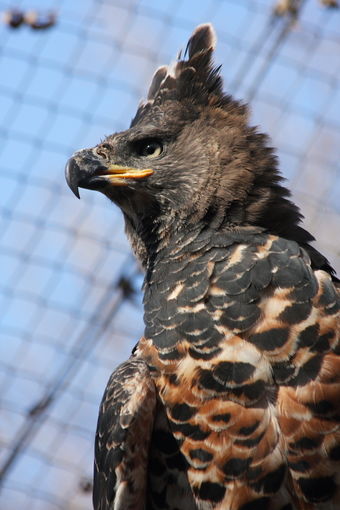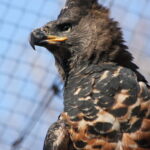Crowned eagles, scientifically known as Stephanoaetus coronatus, are large birds of prey native to the forests of sub-Saharan Africa. While there is no definitive information on whether crowned eagles mate for life, their breeding habits provide some insights into their mating behavior.
Breeding Cycle of Crowned Eagles
Crowned eagles have a prolonged breeding cycle, taking approximately 500 days to complete, which is significantly longer than most other eagle species. They breed once every two years, and their breeding can occur almost year-round throughout their range, though egg laying seems to peak roughly around the end of the African wet season or the early dry season, from July to November.
Territorial Behavior
Crowned eagle pairs maintain territories or home ranges vigorously, which can vary in size from 140 to 200 km2 (54 to 77 sq mi) in Zimbabwe and 30 km2 (12 sq mi) near the city of Nelspruit in South Africa. The mean distance between active nest sites in southern Africa can range from 2 to 19.5 km (1.2 to 12.1 mi).
Nest Building
After engaging in a breeding display, the pair collaborates in building a massive nest in a fork of a large forest tree, typically from 12 to 45 m (39 to 148 ft) above the ground. The female fetches more nesting material, while the male tends to be more active in nest construction.
Pair Bonding
While crowned eagles do form strong pair bonds and maintain territories, there is no definitive evidence to suggest that they mate for life. The available information suggests that they may be serially monogamous, meaning they form exclusive breeding pairs for a single breeding season, but may change partners in subsequent breeding seasons.
Factors Influencing Mating Behavior
Several factors may influence the mating behavior of crowned eagles, including:
-
Habitat Availability: The availability of suitable nesting sites and prey resources within their territories may play a role in their mating and breeding decisions.
-
Breeding Success: Pairs that successfully raise offspring may be more likely to remain together for subsequent breeding seasons, while unsuccessful pairs may be more inclined to seek new partners.
-
Mate Availability: The availability of potential mates within their breeding range may also influence their mating behavior, as they may need to adapt to changing circumstances.
-
Environmental Conditions: Changes in environmental conditions, such as drought or habitat degradation, may also impact the mating and breeding patterns of crowned eagles.
Conclusion
In summary, while crowned eagles exhibit strong pair bonding and territorial behavior, there is no conclusive evidence to suggest that they mate for life. Their breeding habits and mating behavior appear to be more complex, with factors such as habitat availability, breeding success, mate availability, and environmental conditions potentially influencing their mating strategies.


